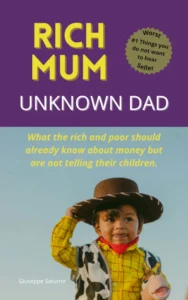“Rich Dad, Poor Dad” by Robert Kiyosaki has been a personal finance bestseller for years, but Giuseppe Saturno‘s Rich Mum, Unknown Dad offers a sharp and insightful critique of Kiyosaki’s philosophy, revealing the ethical pitfalls and societal consequences of his teachings.

Saturno argues that Kiyosaki’s emphasis on individual financial gain at all costs comes at the expense of community well-being, ethical behavior, and environmental sustainability. He exposes how Kiyosaki’s strategies, while potentially lucrative for individuals, contribute to a system that perpetuates inequality and undermines the common good.
Here are the key flaws Saturno identifies in Kiyosaki’s approach:
Selfishness and Disregard for Community: Kiyosaki’s mantra of “minding your own business” for financial security fosters a culture of individualism and disregards the importance of cooperation. Saturno argues that true wealth lies in building strong communities where everyone contributes and benefits, not in isolating oneself to maximize personal gain.
Exploitation and Legal Loopholes: Saturno criticizes Kiyosaki’s reliance on exploiting legal loopholes and minimizing tax contributions as unethical and detrimental to society. He argues that these practices deprive the community of essential resources and exacerbate inequality, benefiting the wealthy at the expense of the less fortunate.
Blaming the Victim: Kiyosaki often frames financial struggles as a personal failing, suggesting that “the poor” lack the financial education to improve their circumstances. Saturno counters this by highlighting systemic issues like worker exploitation, the rise of automation, and a flawed education system that prioritizes financial gain over essential skills and knowledge.
“Wild West” Mentality: Saturno condemns Kiyosaki’s “every-man-for-himself” approach as promoting a dangerous mentality that prioritizes personal gain above ethical considerations. He argues that this fosters a cutthroat environment where cooperation and social responsibility are lost in the pursuit of wealth.
Saturno proposes a profoundly different vision of wealth and success. Instead of chasing financial riches through individualistic strategies, he advocates for a holistic approach that values community, sustainability, and ethical behavior.

Key elements of Saturno’s alternative vision include:
Embracing Permaculture: Saturno highlights permaculture as a model for sustainable living and wealth creation. This approach focuses on working in harmony with natural systems, minimizing waste, and building resilient, self-sufficient communities.
Prioritizing Essential Skills: He argues that true wealth lies in acquiring practical skills and knowledge that benefit individuals and communities. This includes areas like agriculture, medicine, engineering, and craftsmanship, skills that contribute to the overall well-being of society.
Fostering Cooperation: Saturno champions cooperation over competition as essential for building a just and equitable society. He advocates for mutual support and collaborative efforts, contrasting this with Kiyosaki’s individualistic approach.
Valuing Natural Assets: He stresses the importance of natural resources as true wealth and criticizes economic models that prioritize financial gain at the expense of environmental degradation. He reminds readers that access to clean air, water, and fertile land are fundamental for human well-being and cannot be replaced by financial assets.
Rich Mum, Unknown Dad is a powerful call to re-evaluate our understanding of wealth and success. Saturno challenges us to move beyond the narrow focus on individual financial gain and embrace a more ethical, sustainable, and community-oriented approach that recognizes our interconnectedness and responsibility to future generations.